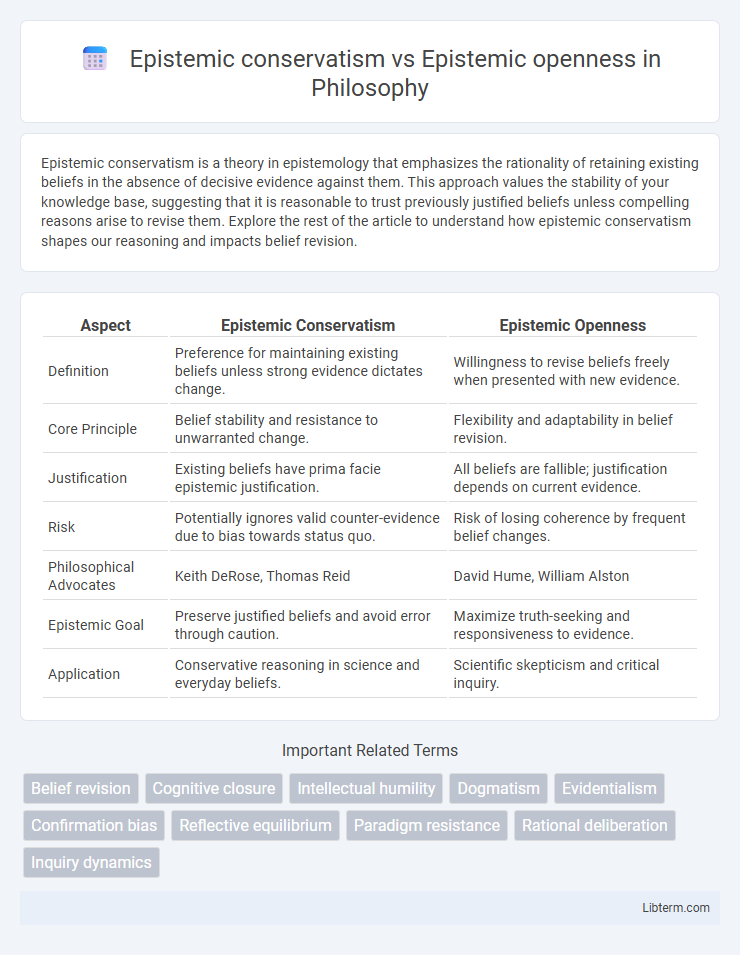Epistemic conservatism is a theory in epistemology that emphasizes the rationality of retaining existing beliefs in the absence of decisive evidence against them. This approach values the stability of your knowledge base, suggesting that it is reasonable to trust previously justified beliefs unless compelling reasons arise to revise them. Explore the rest of the article to understand how epistemic conservatism shapes our reasoning and impacts belief revision.
Table of Comparison
| Aspect | Epistemic Conservatism | Epistemic Openness |
|---|---|---|
| Definition | Preference for maintaining existing beliefs unless strong evidence dictates change. | Willingness to revise beliefs freely when presented with new evidence. |
| Core Principle | Belief stability and resistance to unwarranted change. | Flexibility and adaptability in belief revision. |
| Justification | Existing beliefs have prima facie epistemic justification. | All beliefs are fallible; justification depends on current evidence. |
| Risk | Potentially ignores valid counter-evidence due to bias towards status quo. | Risk of losing coherence by frequent belief changes. |
| Philosophical Advocates | Keith DeRose, Thomas Reid | David Hume, William Alston |
| Epistemic Goal | Preserve justified beliefs and avoid error through caution. | Maximize truth-seeking and responsiveness to evidence. |
| Application | Conservative reasoning in science and everyday beliefs. | Scientific skepticism and critical inquiry. |
Understanding Epistemic Conservatism
Epistemic conservatism asserts that existing beliefs possess a prima facie epistemic justification simply because they are already held, emphasizing the resistance to change accepted knowledge without strong opposing evidence. This principle highlights the inherent value of stability in belief systems, suggesting that new information must be compelling enough to override prior convictions. Understanding epistemic conservatism involves recognizing its role in balancing skepticism and acceptance, maintaining coherent knowledge while allowing for revision when justified.
Defining Epistemic Openness
Epistemic openness emphasizes maintaining a willingness to revise beliefs and consider new evidence or viewpoints, fostering intellectual humility and adaptability in knowledge acquisition. It contrasts with epistemic conservatism, which prioritizes preserving existing beliefs unless strong reasons compel change. Defining epistemic openness involves valuing cognitive flexibility and the ongoing interrogation of assumptions to enhance understanding and mitigate bias.
Core Principles of Epistemic Conservatism
Epistemic conservatism holds that existing beliefs possess an intrinsic epistemic justification, emphasizing stability and resistance to change without compelling reasons. Core principles include the preservation of justified beliefs, prioritizing evidence already integrated into one's cognitive framework, and resisting adopting new beliefs solely based on their novelty or external appeal. This view contrasts with epistemic openness, which encourages reevaluating and revising beliefs more readily in response to new evidence or arguments.
Foundations of Epistemic Openness
The foundations of epistemic openness emphasize the importance of being willing to revise beliefs based on new evidence and arguments, contrasting with epistemic conservatism, which prioritizes retaining existing beliefs unless overwhelming reasons for change arise. Epistemic openness fosters critical inquiry, intellectual humility, and adaptability, encouraging continuous evaluation and potential restructuring of knowledge frameworks. This approach supports a dynamic understanding of knowledge that accommodates uncertainty and promotes the pursuit of truth through ongoing dialogue and evidence assessment.
Historical Development of Both Approaches
Epistemic conservatism emerged prominently in 20th-century epistemology, emphasizing the retention of existing beliefs unless compelling evidence arises, rooted in the works of philosophers like Richard Foley and Daniel Christensen. In contrast, epistemic openness developed as a response, advocating for the continual revision of beliefs in light of new evidence, influenced by the principles of fallibilism and the scientific method. The historical development of these approaches reflects a broader philosophical debate over the justification and flexibility of knowledge acquisition.
Advantages of Epistemic Conservatism
Epistemic conservatism promotes stability in belief systems by valuing existing knowledge and minimizing unnecessary doubt, which fosters intellectual consistency and reliability. It prevents frequent belief revisions, reducing cognitive overload and helping individuals maintain coherent worldviews. This approach supports a pragmatic balance between openness to new evidence and respect for well-established truths, enhancing decision-making efficiency.
Benefits of Epistemic Openness
Epistemic openness promotes intellectual humility and adaptability by encouraging continuous reevaluation of beliefs in light of new evidence, enhancing critical thinking skills. It supports collaborative knowledge-building and innovation by fostering diverse perspectives and reducing cognitive biases. Embracing epistemic openness leads to more resilient and accurate understanding, essential for scientific progress and effective decision-making.
Major Criticisms and Limitations
Epistemic conservatism faces criticism for potentially fostering dogmatism by excessively valuing existing beliefs without sufficient scrutiny, leading to resistance against new evidence or alternative perspectives. Conversely, epistemic openness is challenged for risking epistemic relativism and instability, as an unrestricted acceptance of new information may undermine the reliability of knowledge and hinder commitment to justified beliefs. Both approaches encounter limitations in balancing belief persistence and adaptability, highlighting the difficulty in establishing criteria for rational belief revision amid evolving evidence.
Practical Implications in Knowledge Acquisition
Epistemic conservatism emphasizes retaining prior beliefs unless strong evidence compels change, promoting cognitive stability and consistent decision-making in knowledge acquisition. Epistemic openness encourages continual revision of beliefs in light of new evidence, fostering adaptability and responsiveness to novel information. Balancing these positions affects practical outcomes in education, scientific research, and critical thinking, where rigidity hinders innovation but excessive skepticism may impede knowledge consolidation.
Striking a Balance: Integrating Conservatism and Openness
Striking a balance between epistemic conservatism and epistemic openness involves maintaining justified belief systems while remaining receptive to new evidence and perspectives. Epistemic conservatism emphasizes preserving existing beliefs that have proven reliable, whereas epistemic openness encourages critical evaluation and adaptation when confronted with novel information. Integrating these approaches fosters a dynamic epistemic framework that supports both cognitive stability and intellectual growth.
Epistemic conservatism Infographic

 libterm.com
libterm.com